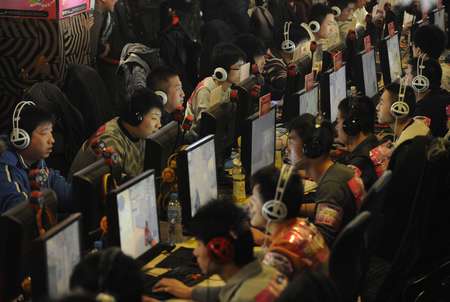Great Firewall father speaks out
 |
|
Web users surf at an Internet bar in Taiyuan, capital of Shanxi Province. [Photo: www.qq.com] |
Patient and rational
The father of the Great Firewall doesn't avoid defending the momentous Chinese mainland decision to monitor the flow of information on the Internet.
Such a firewall is a "common phenomenon around the world," he argues, and nor is China alone in monitoring and controlling the Internet.
"As far as I know, about 180 countries including South Korea and the US monitor the Internet as well."
He avoids all discussion of the relative quantity and qualities of overseas censorship when compared to his own unique creation.
Some foreign countries - even developed countries - ban access to websites when content violates their laws, such as neo-Nazi information blocked by Germany.
What irks many Chinese online users is simply being unable to access such apparently harmless fare as Facebook or YouTube.
Social networking tools are reportedly not just designed to entertain. Asked what would happen next after political upheavals rocked Tunisia and Egypt, Wael Ghonim, one of the individuals responsible for toppling the Mubarak regime replied, "Ask Facebook."
Fully aware of the political influence of the Internet, the US has stepped up its efforts to research online penetration tools and exert pressure on foreign governments such as China.
US Secretary of State Hillary Clinton said in a speech on Tuesday that the US administration would spend $25 million this year helping online users get around such curbs as the Great Firewall of China to achieve "absolute freedom" of Internet information flow.
Asked to comment on Clinton's speech earlier this week, Foreign Ministry spokesman Ma Zhaoxu Thursday repeated previous statements that online users in China enjoy freedom of speech "in accordance with the law."
"China objects to any country's interference with China's internal affairs under the banner of Internet freedom."
Everlasting war
Fudan University professor Zhang Zhian notes that during the last decade, China's Internet freedom has developed a lot in terms of Web user awareness and freedom of speech.
"The change has been huge," he says. "China's Internet is still in the process of development.
"We'll listen to foreign countries' opinions on the development of China's Internet, but we should have our own timetable.
"The process takes time and we should be patient and rational."
Fang concedes his Great Firewall doesn't do a great job of distinguishing between good and evil information. If a website contains sensitive words, the firewall often simply blocks everything "due to the limitations of the technology," he says, expecting it would become more sophisticated in the future.
"The firewall monitors them and blocks them all," he says. "It's like when passengers aren't allowed to take water aboard an airplane because our security gates aren't good enough to differentiate between water and nitroglycerin."
Before he speaks, the GFW's father always pauses a few seconds and then when he talks, adopts a measured tone and a considered pace.
Calls for a more open information flow represent a soft power threat to China from foreign forces, Fang asserts.
"Some countries hope North Korea will open up its Internet," he says. "But if it really did so, other countries would get the upper hand."
When US President Barack Obama visited Shanghai, he talked about the importance of a more open Internet with Chinese students.
Some analysts perceive freedom of speech as expanding on the Chinese mainland in recent years via the Internet, while others argue that the Great Firewall is as belligerent as ever.
With more than 450 million Internet users, China now has the largest national online population in the world.
It's an everlasting war between the GFW and VPNs, Fang says.
"So far, the GFW is lagging behind and still needs improvement," he says.
The situation is better described as traffic control, Fang says.
"Drivers just obey the rules and so citizens should just play with what they have."
 0
0 






